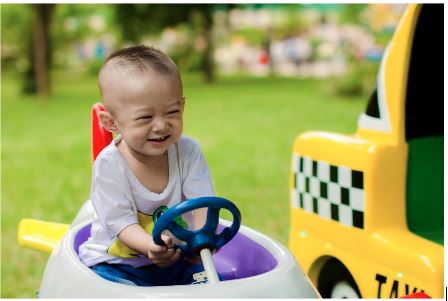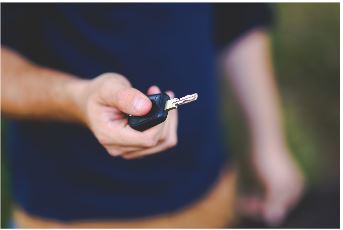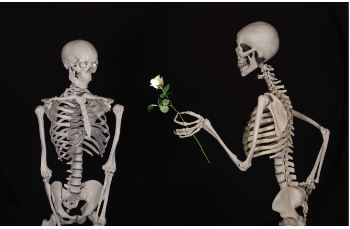The Hidden Factors Influencing Our Most Important Decisions

By Charles Cassidy MPhys, Director of Evidence-based Wisdom
I recently decided to buy a petrol-guzzling car. But was it really me who decided? I don’t like cars. They’re costly on the wallet and toxic to the planet. I also live in London, a city of narrow, Victorian streets, where graceful parallel parking is a daily necessity. The only time I have ever gracefully parallel parked was in my driving test 23 years ago.
How did I end up doing something so out of character? I’ve always considered myself to be pretty clear on my principles. But I’d been caught in the act, exhibiting a gross ethical malfunction. Where was my virtuous character now?! An unsettling idea entered my mind. Might I not be as independently minded as I thought? The English writer George Eliot suggests I am not alone: “There is no creature whose inward ring is so strong that it is not greatly determined by what lies outside it.”
If my character and personality weren’t in the driving seat, what else was hijacking my decision?
Am I “driving under the influence,” and if so, under the influence of what?
DECISIONS, DECISIONS – HIDDEN FACTORS
Such questions have fascinated behavioral scientists for decades. One such scientist is social psychologist Professor Richard Nisbett. The well-known writer Malcolm Gladwell recently described Nisbett as the most influential thinker in his life. Nisbett claims our decisions are influenced by a combination of internal and external factors:
There are two broad classes of factors that would help explain someone’s behaviour – what kind of situation is the person in, and what kind of person you have. Obviously any behaviour you get out of anybody is a function of “what’s going on/what he’s responding to” and “what’s in the person.”
“Internal factors” are the typical elements that we think of as having an influence on our decisions – our character traits, temperament, personal biases, previous experiences, willpower etc.
“External factors” are a little more unexpected. They are the hidden strings of the environment that guide our hands without us knowing.
So what hidden external forces might have guided my hand towards the jangling keys of a second-hand Mazda sedan? What on earth was going on here?

EXTERNAL FORCES PART I: PEER NETWORKS
Before the arrival of virtual social networks, there were real-world social networks, composed of friends, family and colleagues. While recent media attention has been focused on filter bubbles in the online world, the power of our real-world social networks has been gravely overlooked.
Recent research suggests that the general behaviours of others in our networks greatly influence our individual behaviour. Scientists have now identified detailed mathematical models that precisely describe how all sorts of human behaviours spread through our peer networks. Perhaps my new car and I were being pushed around by the mathematics of friendships?
First, obesity – Nicholas Christakis of Harvard Medical School and Professor James Fowler produced research in 2007 showing that if one of your friends becomes obese in a given period, your chance of becoming obese increases by 57%.
And divorce? In 2013, they went on to show that if someone you know is divorced, you are 75% more likely to be divorced. Even if a friend of a friend is divorced, you are 33% more likely to be divorced.
Registering my new car online, I began to wonder, are my friends secretly driving me into an early grave?

Fortunately, it’s not only bad behaviour that spreads in this fashion. The researchers also showed that if your spouse quits smoking, you are 65% less likely to smoke. Even if a friend quits, you are 36% less likely to smoke.
Some good news then, but I still found these cold numbers chilling. To learn that decisions which we view as “independently taken” are so strongly influenced by the behaviour of friends and family was unnerving. So I took a moment to consider the automotive habits of my peer network.
I don’t know anyone who doesn’t own a car.
EXTERNAL FORCES PART II: THE IMMEDIATE SITUATION
The behaviour of our established peer network is not the only hidden force at work. There is also the influence of the immediate situation we find ourselves in. I will likely strike up conversation with a stranger at a rock concert in the park on a sunny day. This is less likely at 2am in a dark alley in an unfamiliar part of town. A sinister situation overrides an outgoing personality.
In fact, one of the cornerstone principles of social psychology is that the immediate situation we find ourselves exerts a huge influence on our behaviour. A famous 1973 Princeton study, sometimes known as The Good Samaritan Experiment, demonstrated this clearly. People’s willingness to stop and help a stranger-in-need depended significantly more on how much of a hurry they happened to be in, rather than how they had scored for “religiosity” on a personality assessment. Again, a subtle element of the immediate situation trumps an internal personality trait.
Now I didn’t buy my Mazda at 2am in a dark alley, but I began to wonder how else my everyday decisions were at the mercy of hidden external factors. I run a project called Evidence-Based Wisdom. We translate scientific wisdom research into understandable and helpful resources for the public. So, I am of course interested in how we might make wiser decisions in our daily lives – buying a Mazda, moving to a new city, or even deciding where to mark my cross on the ballot paper come election time.
Wisdom has typically been considered a characteristic that either you have or don’t. We can all cite examples of classic wise figures – Socrates, Gandhi, Martin Luther King.
Surely something as timeless and weighty as wisdom doesn’t depend on trivial aspects of our immediate environment, does it?
A recent 2017 study tells quite a different story. The lead scientist was Igor Grossmann, Director of The Wisdom and Culture Lab. He is a leading light in the emerging field of wisdom research, and also a former student of Richard Nisbett.
His paper indicated that, when it comes to wise reasoning over the course of a single day, there is more variability within people than there is between people. This means, it’s not that some of us are always wise and some are always not. It’s that all of us are sometimes wise, and all of us are sometimes not.
As psychologists would say, wisdom appears to concern specific “states,” rather than solely “traits.” It would seem that even our wisdom varies greatly depending on the immediate situation.
If wisdom varies so much, when are we are at our wisest? A 2016 study from Grossmann’s lab shows that, perhaps surprisingly, we take wiser decisions when in company rather than when alone.
Grossmann had already demonstrated in 2014 that we are wiser when reflecting on our own problems as if they were someone else’s problems. Getting some distance from ourselves can help us make wiser choices, but this can be quite challenging when we are alone. This is where company can help. Grossmann explained: “This third-person perspective on the self is likely encouraged when in the presence of friends.”
So, although the bad habits of others may be toxic to their entire network in the long term, having friends around may lead to better immediate decisions. It seems that our friends, rather than being enemies of wisdom, might in fact be its guardians.
This has turned my thinking on its head. I had previously been very much one for taking important decisions only after many hours of scribbling in my notebook, alone, in a coffee shop. I have now changed my tune, and seek out the company of trusted friends who can steer me through the perilous rocks of my own biases, towards much wiser decisions.
Had friends been present when I reached for those jangling keys, my woeful parallel parking skills would still be a secret to this day.
PRACTICAL ACTIONS
ACTION 1: Choose your peers wisely – they will influence your behaviour, so spend time with people whose behavior you are happy to be influenced by.
ACTION 2: Take important decisions in the presence of others.
QUESTIONS
- When you observe your friends’ behaviours and habits, are you comfortable with the knowledge that you are likely to adopt these same behaviours and habits over time?
- Can you think of times when you have been surprised by a decision you took? Can you think of any external factors that may have been at play?
- If you tend to take important decisions alone, might you start to bounce ideas off of friends and colleagues to increase your chance of making a wiser call?




